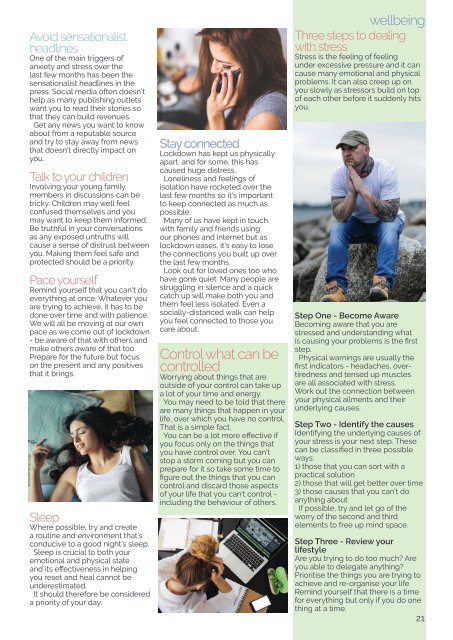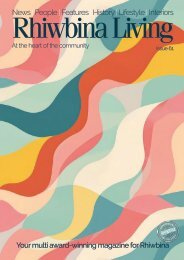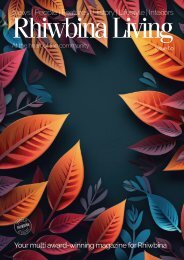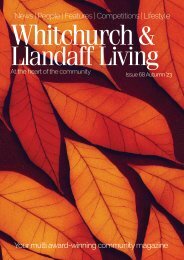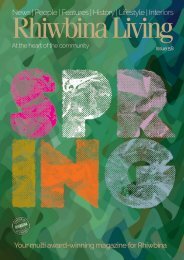Rhiwbina Living Issue 50
Summer 2020 issue of the award-winning magazine for Rhiwbina
Summer 2020 issue of the award-winning magazine for Rhiwbina
Create successful ePaper yourself
Turn your PDF publications into a flip-book with our unique Google optimized e-Paper software.
Avoid sensationalist<br />
headlines<br />
One of the main triggers of<br />
anxiety and stress over the<br />
last few months has been the<br />
sensationalist headlines in the<br />
press. Social media often doesn't<br />
help as many publishing outlets<br />
want you to read their stories so<br />
that they can build revenues.<br />
Get any news you want to know<br />
about from a reputable source<br />
and try to stay away from news<br />
that doesn't directly impact on<br />
you.<br />
Talk to your children<br />
Involving your young family<br />
members in discussions can be<br />
tricky. Children may well feel<br />
confused themselves and you<br />
may want to keep them informed.<br />
Be truthful in your conversations<br />
as any exposed untruths will<br />
cause a sense of distrust between<br />
you. Making them feel safe and<br />
protected should be a priority.<br />
Pace yourself<br />
Remind yourself that you can't do<br />
everything at once. Whatever you<br />
are trying to achieve, it has to be<br />
done over time and with patience.<br />
We will all be moving at our own<br />
pace as we come out of lockdown<br />
- be aware of that with others and<br />
make others aware of that too.<br />
Prepare for the future but focus<br />
on the present and any positives<br />
that it brings.<br />
Sleep<br />
Where possible, try and create<br />
a routine and environment that's<br />
conducive to a good night's sleep.<br />
Sleep is crucial to both your<br />
emotional and physical state<br />
and its effectiveness in helping<br />
you reset and heal cannot be<br />
underestimated.<br />
It should therefore be considered<br />
a priority of your day.<br />
Stay connected<br />
Lockdown has kept us physically<br />
apart, and for some, this has<br />
caused huge distress.<br />
Loneliness and feelings of<br />
isolation have rocketed over the<br />
last few months so it's important<br />
to keep connected as much as<br />
possible.<br />
Many of us have kept in touch<br />
with family and friends using<br />
our phones and internet but as<br />
lockdown eases, it's easy to lose<br />
the connections you built up over<br />
the last few months.<br />
Look out for loved ones too who<br />
have gone quiet. Many people are<br />
struggling in silence and a quick<br />
catch up will make both you and<br />
them feel less isolated. Even a<br />
socially-distanced walk can help<br />
you feel connected to those you<br />
care about.<br />
Control what can be<br />
controlled<br />
Worrying about things that are<br />
outside of your control can take up<br />
a lot of your time and energy.<br />
You may need to be told that there<br />
are many things that happen in your<br />
life, over which you have no control.<br />
That is a simple fact.<br />
You can be a lot more effective if<br />
you focus only on the things that<br />
you have control over. You can't<br />
stop a storm coming but you can<br />
prepare for it so take some time to<br />
figure out the things that you can<br />
control and discard those aspects<br />
of your life that you can't control -<br />
including the behaviour of others.<br />
wellbeing<br />
Three steps to dealing<br />
with stress<br />
Stress is the feeling of feeling<br />
under excessive pressure and it can<br />
cause many emotional and physical<br />
problems. It can also creep up on<br />
you slowly as stressors build on top<br />
of each other before it suddenly hits<br />
you.<br />
Step One - Become Aware<br />
Becoming aware that you are<br />
stressed and understanding what<br />
is causing your problems is the first<br />
step.<br />
Physical warnings are usually the<br />
first indicators - headaches, overtiredness<br />
and tensed up muscles<br />
are all associated with stress.<br />
Work out the connection between<br />
your physical ailments and their<br />
underlying causes.<br />
Step Two - Identify the causes<br />
Identifying the underlying causes of<br />
your stress is your next step. These<br />
can be classified in three possible<br />
ways:<br />
1) those that you can sort with a<br />
practical solution<br />
2) those that will get better over time<br />
3) those causes that you can’t do<br />
anything about<br />
If possible, try and let go of the<br />
worry of the second and third<br />
elements to free up mind space.<br />
Step Three - Review your<br />
lifestyle<br />
Are you trying to do too much? Are<br />
you able to delegate anything?<br />
Prioritise the things you are trying to<br />
achieve and re-organise your life<br />
Remind yourself that there is a time<br />
for everything but only if you do one<br />
thing at a time.<br />
21


